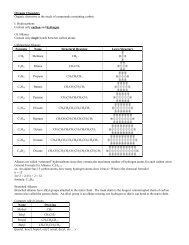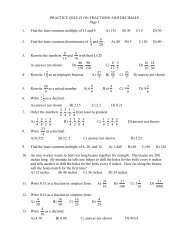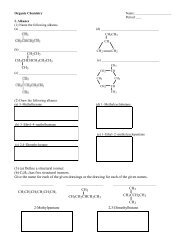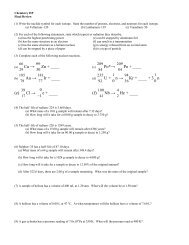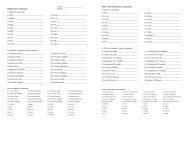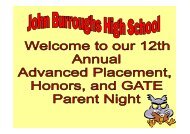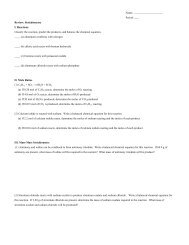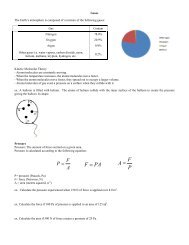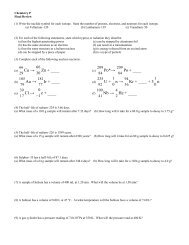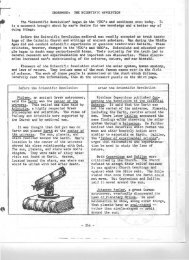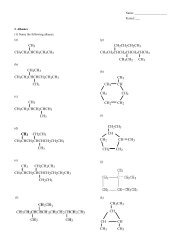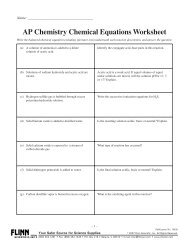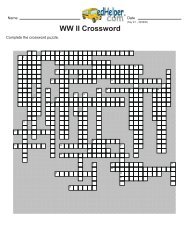peace w/Japan that ended occupation. A Mutual Security Treaty the next year provided forthe stationing of our forced on their soil. China: We didn’t do so well in China, where we insisted on backing Chiang against Mao, whowe refused to talk to once he did <strong>com</strong>e to power in 1949 (this pushed him over to the USSR,but that relationship didn’t last either – Stalin & Mao didn’t get along). Anyway, we didn’trecognize the actual gov’t of China in 1979. Vietnam: During WWII, Ho Chi Minh, while planning to free the nation from the French, alsofought against the Japanese (with our help). Once we “lost China,” though, we decided to backa restoration of French rule in order to (1) gain French cooperation, (2) have more economichegemony in the areas, and (3) Ho was a <strong>com</strong>munist, so we thought he was Sovietsponsored.Anyway, in 1950 we decided to recognize the puppet gov’t under Bao Dai andstart sending weapons and advisers to the French. More on this later…- Then there was the whole Korean War issue, which bears going into. The KW began as a civil war in 1950when North Korea moved across into South Korea (the two parts had been divided in 1945 w/US & USSRapproval). Both leaders hoped to reunify the nation, but Truman thought that the USSR had planned thewhole thing (he hadn’t really, and had barely been convinced to help at all).- Anyway, the United Nations then voted on helping South Korea, and since Stalin wasn’t there (he hadwalked out b/c of the China deal) it went through. MacArthur became <strong>com</strong>mander of UN forces (90% US),and they fought until they not only passed the original boundary but went into NK (hoping to reunify).- UN forces went deep into NK until they were stooped by a surprise counterattack by Chinese forces. Thissent them back to the 38th parallel (original boundary) and e/t MacArthur wanted to go fight China, Trumantold him off and then fired him as a result.- Fighting went on as the POW issue stalled negotiations (US officials said only the prisoners that wanted togo back would be returned, and NK countered by saying they wouldn’t return anyone). An armistice wasfinally signed in 1953 – the POW question was handed over to a board of neutral nations, who ended upgiving the prisoners their choice, and the border went to the 38th parallel again w/a demilitarized zone.- Domestically, the war helped get Eisenhower elected, and also gave the President more power, since hehad never asked Congress for a declaration of war prior to sending the troops.- Overall, Truman’s legacy was a very militarized foreign “containment” policy on a global scale.*The Cold War under Eisenhower*- Eisenhower basically kept up Truman’s policies and made sure the more hawkish (to say the least) JohnFoster Dulles (Secretary of State) didn’t get out of control. Dulles was totally anti-<strong>com</strong>munist (and anti<strong>com</strong>promise)and called for “liberation” (instead of containment) & “brinksmanship” (taking the country to theedge of war and relying on MAD), and popularized the Domino Theory (if one goes they all will).- Eisenhower, however, did rely increasingly on the CIA to buy out foreign leaders, labor unions,newspapers and political parties. The CIA also planted fake stories in newspapers, trained foreign militaryofficials, experimented w/mind control drugs, and launched covert operations to subvert Third World gov’ts.- The Eisenhower administration also tried to spread <strong>Am</strong>erican culture in the USSR and the East (to sparkdiscontent) through the United States Information Agency, which funded the Voice of <strong>Am</strong>erica. There wasalso Radio Free Europe & Radio Liberty, funded by the CIA, which sent anti-Soviet messages, some ofwhich got through.- Meanwhile (“kitchen debates” notwithstanding) the arms race intensified under Eisenhower with theexplosion of the Hydrogen bomb, the first ICBM (USSR), and then Sputnik (1957), which caused a bigruckus over here and got us to start NASA in 1958. E/t we actually had a lot more missiles & crap, we keptworrying about the (non-existent) “missile gap” and building more.- In fact, this even got to be a bit much for Eisenhower (it was tough to balance the budget) so in 1957 somearms-control proposals were started like the “atoms for peace” initiative, the “open skies” proposal, and banson testing. But none of these agreements really worked out despite talks in Geneva in 1955.- Some specific incidents under Eisenhower include: Hungary (1956): When Khrushchev came to power he denounced Stalin and called for moretoleration, which inspired revolts in Poland and Hungary. But after the new Hungarian gov’tdecided to withdraw form the Warsaw Pact Soviet troops crushed the rebellion – and e/t we’dbeen sending all that liberation stuff over the radio, we didn’t do anything (we couldn’t w/ostarting some huge war). Khrushchev’s Ultimatum (1958): The USSR got mad b/c we had bombers in West Germany,and announced that unless we began talks on German reunification and rearmament theywould recognize East German control of all of Berlin. We refused to do anything, and hebacked off – it was basically a test.74
U-2 Incident (1960): Well, in Dublin, Ireland, this really cool band was formed and then – ohcrap, wrong U2, haha I’m obsessed! Anyway, this U-2 plane was flying over the USSR and itwas shot down, leading to some embarrassment for us, esp. when we refused to apologize.Jinmen-Mazu Crisis: This was a dispute over two tiny islands off the Chinese coast with China(go figure) – we were allowing Chiang to use the islands to as outposts to raid the mainland, soChina started bombing them. Eisenhower decided to defend the outposts, pushing the nationto the brink – the Formosa Resolution (1955) authorized the president to send US forces todefend the islands. The issue came up again in 1958, but this time we told Chiang to get rid ofsome of his troops, which led China to stop dropping bombs. China got the bomb in 1964.- Meanwhile, Japan grew (economically) at an incredible rate – while remaining an uneasy Cold War ally.Western Europeans were also a little scared by McCarthyism, German rearmament and the Vietnam deal,and resented being treated as dependents by the US in the name of “<strong>com</strong>munity.”*The Emergence of the Third World*- Due to decolonization, a ton of new states were formed – and before long, once all the other countriesdeclared their allegiances in the Cold War, US and Soviet attention shifted the Third World, which couldprovide markets, supplies of raw materials, and provide sites for military and intelligence bases.- As this wasn’t exactly what most of the Third World had in mind the US began to turn a ton of resourcestowards it – and it wasn’t all aid (based on the views of MIT professor Walt Rostow, Stages of EconomicGrowth) and propaganda (the good ol’ US Information Agency) either – we supported nasty dictators, gotinto civil wars, and used CIA covert operations to squash revolutions.- Nevertheless, some countries – India, Ghana, Egypt, Indonesia, and others – still managed to stay out of itby declaring themselves non-aligned. They then organized at the Bandung Conference (in Indonesia),which got Dulles all annoyed – hey, they have to take sides, our side, I mean.- The US (as always) believed that the Third World needed some tutoring in how to establish a nice capitalistdemocracy (just like ours), and depicted Third World peoples as dependent, irrational, and weak. Raceattitudes also hurt relationships – they made us look bad – as we weren’t exactly living up to all our ideals.*<strong>Am</strong>erican Intervention in the Third World*- More specifically, here’s where and what we did: Guatemala: In 1951 leftist leader Guzmán was elected President, and once he deiced toexpropriate all of United Fruit’s (big US <strong>com</strong>pany) unused land (he offered <strong>com</strong>pensation) UFofficials claimed he was a <strong>com</strong>munist, which led to the generation of a CIA plot to overthrowhim. In 1954 CIA-supported troops drove him from power, and the new pro-US regimereturned the land before a huge civil war erupted. Cuba: In 1959 the Cuban Revolution erupted – Batista was ousted, and Fidel Castro tookcontrol. From the start Castro was anti-<strong>Am</strong>erican, and got rid of a lot of our business interests,which (in addition to his growing popularity and authoritarianism) scared the crap out ofWashington. And once the US cut purchases of Cuban sugar, Castro nationalized all our<strong>com</strong>panies and asked the USSR for loans and more trade to hold off the US. Eisenhowerbroke diplomatic relations in 1961, leaving the whole Bay of Pigs debacle for Kennedy. Puerto Rico: In PR, Operation Bootstrap encouraged <strong>com</strong>panies to invest in tourism andother industries. Middle East: In the Middle East we encountered challenges from Arab nationalists to oursupport of Israel and oil holdings (Iran was our special oil source in exchange for CIA help inthe overthrow of the Shah’s nationalistic rival). Suez Crisis: Since we hated Egypt’s nationalist leader Nasser (non-alignment, pan-Arabism)we suddenly decided we wouldn’t help Egypt finance the Aswan Dam as promised. However,Nasser responded by nationalizing the Suez Canal (and using those profits), which caused theIsraelis (w/GB & French support) to invade Suez in 1956. Fearing it would force the Egyptiansinto the arms of the USSR, Eisenhower told them to pull out, which they did – Egypt tookcontrol of the canal, the USSR built the Dam, and Nasser became a big hero. Eisenhower Doctrine (1957): To try to improve our position in the ME, Eisenhower declaredthat the US would intervene in the ME if any gov’t threatened by a <strong>com</strong>munist takeover askedfor help. This led to troops being sent to Lebanon in 1958.- And then there was the big story: Vietnam. Here’s how it all started. Even though the US was helpingthem, the French were losing big time to the Vietminh (Ho’s forces). Finally, at Dienbienphu (1954) theFrench surrendered (despite US attempts to rally a coalition around them).75
- Page 3 and 4:
Congregationalists (Puritans) - The
- Page 5 and 6:
- So the Restoration Colonies, form
- Page 7 and 8:
- So in England, where they were lo
- Page 9 and 10:
*Colonial Politics 1700-1750: Relat
- Page 11 and 12:
- Another ideology that was beginni
- Page 13 and 14:
- The Quebec Acts were passed aroun
- Page 15 and 16:
- So, by 1782, what had seemed to b
- Page 17 and 18:
on the economic side, since the gov
- Page 19 and 20:
- Anyway, Congress had several ques
- Page 21 and 22:
- Adams was still in the early Wash
- Page 23 and 24: *Political Factionalism and Jeffers
- Page 25 and 26: - Samuel Slater set up the first te
- Page 27 and 28: - Court rulings extended the powers
- Page 29 and 30: Revival, Reform and Politics during
- Page 31 and 32: - Anyhow, during his administration
- Page 33 and 34: TEXAS (Southerners) - Texas had bee
- Page 35 and 36: - Anyhow, Pierce’s total support
- Page 37 and 38: They had a smaller everything: smal
- Page 39 and 40: - The two Northern victories at the
- Page 41 and 42: - The result was the Fourteenth Ame
- Page 43 and 44: The Slaughter-House Cases (1873) -
- Page 45 and 46: in the arrest of 8 immigrant radica
- Page 47 and 48: case (1897 - ICC can’t set rates)
- Page 49 and 50: - The Populists prepared to run aga
- Page 51 and 52: - MOST IMPORTANTLY, though, was the
- Page 53 and 54: - So, what led the US to undertake
- Page 55 and 56: - The rebellion, led by Emilio Agui
- Page 57 and 58: - Still, Americans managed to turn
- Page 59 and 60: - So - the point of this episode? B
- Page 62 and 63: *Hoover’s Response*- Poor Herbert
- Page 64 and 65: - In FDR’s second term, however,
- Page 66 and 67: Dominican Republic - When we left i
- Page 68 and 69: World War II (1941 - 1945)*The Cour
- Page 70 and 71: - So Truman started off again all c
- Page 72 and 73: - First of all, the 1950s were (for
- Page 76: - France wanted out, so at the Gene



